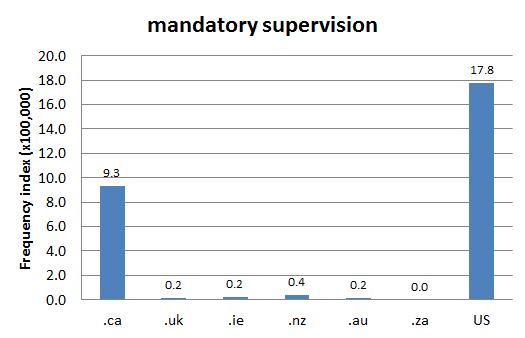DCHP-2
mandatory supervision DCHP-2 (August 2016)
n. — Law (obsolete), continued in news reporting
the final period of a criminal sentence (usually the last third) when an inmate is released from prison to serve the remainder of the sentence under supervision.
Type: 3. Semantic Change — In Canada, the general sense of mandatory supervision took on a narrow legal sense. Early release from prison on mandatory supervision could not be denied (see the 1992 quotation) unless an offender breached release conditions or was deemed a dangerous offender. The term mandatory supervision was replaced by statutory release under the Corrections and Conditional Release Act (1992). It applies to all prisoners who are not serving life or indefinite sentences. However, since all prisoners on conditional release are supervised, the term mandatory supervision in its general rather than legal sense still applies to their condition. Mandatory supervision differed from parole (as does statutory release) because the Parole Board does not determine the release date, although it can apply to detain a prisoner under certain conditions.
In the US the term is more frequent, see Chart 1, but the legal sense of the term as applied in different jurisdictions is different from its Canadian legal sense. See also Parole Board of Canada reference, "History of Parole in Canada". In the legal system, mandatory release was replaced by statutory release in 1992. It is granted automatically to those serving non-life and non-indefinite sentences whose parole was denied or who did not apply, unless the risk for re-offending is considered high.
See also COD-2, s.v. "mandatory supervision", which is labelled "Cdn". Not listed in Gage-5 and ITP Nelson.See also: dangerous offender day release gate ((v.)) day parole
References:
- COD-2
- Gage-5
- ITP Nelson
- Parole Board of Canada "History of Parole in Canada" Accessed 11 Jul. 2013
Images:
Chart 1: Internet Domain Search,15 Aug. 2012
